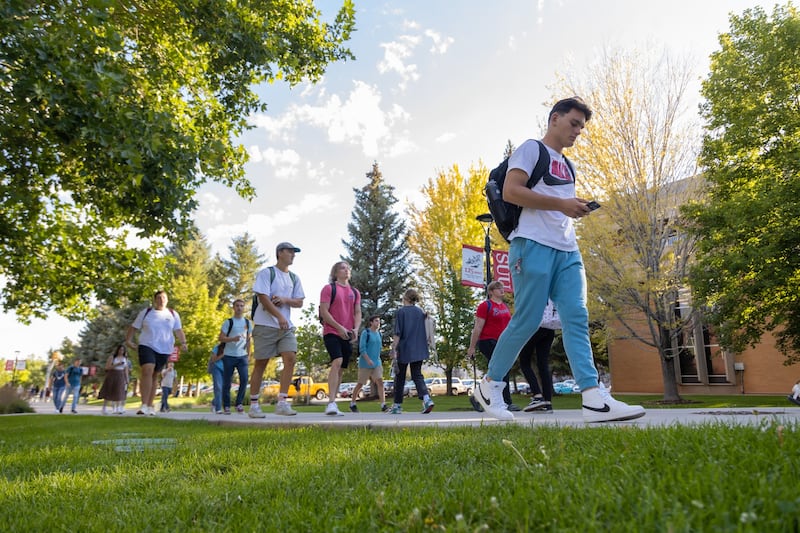Last year, I published an opinion piece here in the Deseret News about my proposed bill to restore a classical Western core curriculum to our public universities. The intent was, I wrote, “a return to the intellectual foundations of American and Western civilization” on campus, “to produce the leaders and the informed, conscientious citizens of tomorrow.”
Though the bill last year was well received by my fellow senators, they felt that the proposed changes required more time and consideration. My bill did not pass committee, though my colleagues strongly encouraged further work on the issue. That process has resulted in this year’s SB334.
Much has changed in just a year. For one thing, there has been a major shift in the nation’s mood. In November, voters expressed a deep dissatisfaction with the direction of the country, and so, elected an “agent of change” in the form of President Donald Trump. Part of what drove voters to Trump was a rejection of political correctness and the so-called “woke” agenda. Caterwauling from the legacy media aside, the majority of Americans support a return to “common sense” and favor a general change in direction.
Last year, we pointed out that taxpayers have funded a 40-year, left-leaning academic experiment that has left multiple generations of graduates with little or no understanding of the history and intellectual contributions of, for example, ancient Greece and Rome, medieval Europe, the Renaissance, and the Enlightenment. Momentous world developments like the dawning of Christianity, parliamentary democracy and the Industrial Revolution are left unexplored.
Many students graduate with little exposure to the tragedies and lessons of the 20th century, such as the rise and fall of the Soviet Union and Nazi Germany. Students are shielded from the real-world consequences of the Marxism so insidiously infused into today’s so-called core curriculum. Pervasive postmodern critical theories have also managed to twist and suppress history and thus rob students of crucial lessons and wisdom of the past.
This alarming deficit of historical perspective is no accident. Neo-Marxist thought has accrued outsized curricular and governing influence on the modern campus, and for the Marxist, historical illiteracy is a feature, not a bug. If you doubt me, let Marx speak for himself. “In bourgeois society,” he wrote, “the past dominates the present; in Communist society, the present dominates the past.” (In other words, Marx preferred that we become “unburdened by what has been.”)
SB334 offers the chance for public universities to course correct, restoring a commitment to free thought, free speech and solid citizenship. After decades of progressive dominance on campus, the appetite to revive a classical core liberal arts curriculum that features Western principles of law, liberty and constitutional self-government has grown more acute.
The good news is that this year, far from forcefully imposing a classical curriculum on Utah universities, we are enjoying a willing partnership in reestablishing an appreciation of core Western principles on campus. We are actively working with Utah State University, for one, in developing our first “Center for Civic Excellence.” We are working to iron out the details of reviving the classical core liberal arts curriculum, and other Utah schools are watching with interest.
To reference some of our working materials with USU, the plan is to replace the existing distribution model of general education. “Through engagement with foundational primary texts representing ‘the best of what has been thought and said,’ this general education program will ensure that all graduates, regardless of their major, engage with the big questions, great debates, and enduring ideas that continue to shape our self-understanding, the American experience, and our world.”
The only way to undo the damage done by a directionless core curriculum is to revivify the fundamental philosophical, historical, moral and ethical thinking that forged Western culture and led to our nation’s founding. If SB334 passes, graduates will emerge from degree programs with common grounding in the intellectual, artistic, scientific, mathematical and literary traditions that once led us to feel like “One nation under God.”
We can best serve today’s students and prepare them to excel, not with rigid ideologies or narrow skill sets, but by preparing them to think critically, to adapt and grow. Taking the university’s core curriculum “back to the future” through the traditional liberal arts will open students’ minds, giving them broad appreciation for the foundational literature, art and philosophy of America’s birth and the blossoming of Western culture and thought.
I believe more strongly than ever that, to maintain its relevance, the university must resume its key role in the generational transfer of the intellectual foundations of American and Western civilization. Yes, graduates must be equipped to meet our future workforce needs, but more importantly, they must be prepared to lead our families, communities and our constitutional republic.

